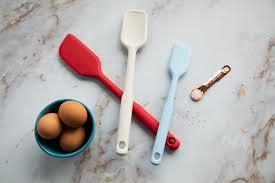Sponsorizzato
Is Silicone Spatula Heat-Resistant or Does It Melt?

Silicone spatulas have become a staple in modern kitchens, known for their flexibility, durability, and ease of use. However, many home cooks and professional chefs often wonder: does silicone spatula melt? Understanding the heat resistance of silicone spatulas can help ensure safe and effective cooking practices.
What is a Silicone Spatula Made Of?
A silicone spatula is crafted from food-grade silicone, a synthetic polymer derived from silicon, oxygen, carbon, and hydrogen. This material is highly flexible, non-toxic, and resistant to moisture and stains. Silicone is widely used in kitchen utensils because it does not react with food, making it a safer alternative to plastic and rubber materials.
Does Silicone Spatula Melt at High Temperatures?
One of the most common concerns among users is: does silicone spatula melt when exposed to heat? The answer depends on the quality and temperature tolerance of the silicone. High-quality silicone spatulas are designed to withstand extreme temperatures, usually ranging from -40°F to 600°F (-40°C to 315°C). This means they do not melt under typical cooking conditions, such as frying, baking, or stirring hot soups.
However, if a silicone spatula is exposed to direct flames, placed on a stovetop burner, or subjected to temperatures beyond its resistance level, it may degrade or lose its shape over time. While silicone does not technically melt like plastic, it can become damaged if misused.
How Heat-Resistant is a Silicone Spatula?
Silicone spatulas are engineered to withstand high heat without breaking down. Here are some key points about their heat resistance:
-
Oven-Safe: Many silicone spatulas are oven-safe up to 500°F (260°C), making them ideal for mixing and scraping ingredients in hot environments.
-
Frying and Sautéing: Silicone spatulas can be used in frying pans and woks without melting, as long as the oil temperature stays within their heat tolerance.
-
Boiling Water: These spatulas remain unaffected when used for stirring soups, sauces, or boiling liquids.
-
Microwave-Safe: Food-grade silicone can be safely used in microwaves without melting or leaching chemicals.
Advantages of Using Silicone Spatulas in Cooking
There are several reasons why silicone spatulas are a preferred choice for cooking:
1. Non-Stick and Easy to Clean
Silicone spatulas do not stick to food or cookware, making them easy to clean. Most of them are dishwasher-safe, reducing the effort needed for maintenance.
2. Safe for Non-Stick Cookware
Unlike metal utensils, silicone spatulas do not scratch non-stick pans and pots. This prolongs the life of cookware and ensures food remains free from unwanted debris.
3. Durability and Longevity
High-quality silicone spatulas are resistant to cracking, chipping, or breaking. They last longer than wooden or plastic spatulas, making them a cost-effective choice.
4. Odor and Stain Resistance
Silicone does not absorb odors, colors, or flavors from food. This makes it ideal for mixing both sweet and savory dishes without cross-contamination.
5. Heat and Cold Resistance
Silicone spatulas can be used in both high-temperature cooking and cold food preparation, such as mixing ice cream or frozen desserts.
Common Misconceptions About Silicone Spatulas
Despite their numerous advantages, there are some misconceptions regarding silicone spatulas:
-
“Silicone Spatulas Are the Same as Plastic” – Unlike plastic, silicone is heat-resistant and does not melt easily under normal cooking conditions.
-
“Silicone is Toxic” – Food-grade silicone is non-toxic and free from harmful chemicals such as BPA, making it safe for food contact.
-
“Silicone Spatulas Can’t Be Used in High Heat” – While they should not be exposed to direct flames, silicone spatulas can handle high temperatures in baking, frying, and boiling.
How to Prevent Damage to Your Silicone Spatula
Although silicone spatulas are highly durable, improper usage can shorten their lifespan. Here are some tips to prevent damage:
-
Avoid Direct Flames – Never place a silicone spatula directly over an open flame, as it can cause the material to degrade.
-
Check Temperature Ratings – Always verify the manufacturer’s heat tolerance recommendations before using a silicone spatula in high-temperature cooking.
-
Store Properly – Keep silicone spatulas in a dry place and avoid heavy stacking that might bend or deform them.
-
Clean Regularly – Wash them thoroughly after each use to prevent buildup of grease or food particles.
Final Verdict: Does Silicone Spatula Melt?
So, does silicone spatula melt? The simple answer is no—under normal cooking conditions, a high-quality silicone spatula will not melt. Silicone is designed to be heat-resistant, making it safe for use in baking, frying, and boiling. However, improper usage, such as exposure to direct flames or extreme temperatures beyond its tolerance, can cause deterioration over time.
For those looking for a reliable, non-toxic, and long-lasting kitchen tool, a silicone spatula is an excellent choice. By understanding its heat resistance and taking proper care, you can enjoy its benefits for years to come.
Would you like recommendations for the best heat-resistant silicone spatulas? Let us know, and we’d be happy to help!



